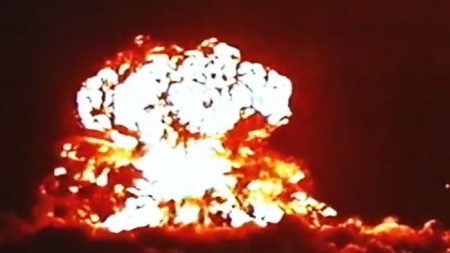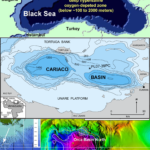March 4, 2018 – Vladimir Putin this week boasted about new Russian nuclear-tipped weapons that were unstoppable. At a stump speech to Russian voters for the upcoming election, he showed a video of nuclear warheads raining down on the State of Florida. Was this a bully’s taunt aimed at President Trump and his Mar-a-Lago southern White House? Or does Putin and his Russian supporters see a war with the United States a likely event before the end of the decade?
Futurists shouldn’t be talking about war but indeed, it appears that more effort and money is going into military invention and action than at any time since the lead up to World War Two.
The United States, with the largest armed forces and a bloated military budget, has been given through the last few administrations more money than reasonably needed to defend the country. And now an additional plus $50 billion is being thrown at the Pentagon with announcements that America is about to create the next generation of nuclear weapons and refurbish its existing deterrent.
In admonishing NATO countries about their lack of contribution to the collective defense of Europe, President Trump has goaded the nations of the European Union to up their military expenditures over the next few years. At the same time, the President has cast doubt on the concept of collective defense which has further pushed Europe into accelerating its rearmament. Recently Germany’s Angela Merkel declared to Germans and the rest of Europe that the continent was on its own. Over seventy years after World War Two, Germans are being asked to support an expanded military as a contribution to European defense.
China’s efforts to reassert itself as The Middle Kingdom by the mid-21st century has turned into not just an economic effort at expansionist outreach, but also a massive growth in military capacity including the establishment of hegemony over the South China Sea. The end result of these moves by China is producing an overall arms buildup in the western Pacific. Not only is the United States increasing its naval presence on, over, and under Pacific waters, Japan is ending its pacifist constitution to build a much large military regional presence.
And then there are all the regional conflicts on the go that, in some cases, could lead to an incident that sparks a much wider war. Here are just a few:
The Korean Peninsula
The country since the end of World War Two has been partitioned. Since 1950 the South and North have been at war although a ceasefire has been in place since 1953. The South and North have been pawns in the Cold War that dominated from the 1950s to the fall of the Soviet Union. China and Russia have been patrons of the North. The United States and an alliance of western countries have been patrons of the South. North Korea has developed intercontinental ballistic missiles. North Korea has developed nuclear bombs. The combination is seen as a direct threat to the South, Japan, and the United States. The Americans have a significant number of troops stationed in the South and keep the Pacific fleet nearby.
Strategy to contain the nuclear and missile threat from the North has included the trading of insults by the North’s leader and the U.S. President. It has included economic sanctions, trade restrictions, joint military training exercises in the South, and attempts to sever the relationships the North has with its Russian and Chinese patrons.
Of all the conflict zones on the planet, this one has the makings to become a global war pulling China and Russia in on one side while the United States, Japan, and other western countries attempt to neutralize the North’s nuclear and missile capacity.
The Middle East
There are so many points of conflict in this part of the world it is almost impossible to sort them all out. You have Shia Iran facing off against the Sunni Arab world, supporting a Syrian government that has been fighting against an uprising increasingly backed by different global powers. Russia has allied with Iran and the Syrian government to save the regime from collapsing. The United States and its Sunni Arab state allies have promoted Arab and Kurdish forces to fight the Syrian government.
Turkey, a non-Arab Muslim country, has entered the conflict carving out a buffer along its border with a separate goal to stop the Kurds from establishing a Kurdistan state which could ultimately cause war to break out within the Turkish nation itself. Turkey appears to be fighting everybody in this conflict, shooting down Russian warplanes, getting into battles with American troops supporting Syrian rebels, and launching an offensive against Kurdish controlled areas.
And increasingly Israel has been drawn into the Syrian abyss. Israel fears a future nuclear-armed Iran, and Iran’s client, Hezbollah, a militant Lebanese based group that has been fighting alongside the Syrian government forces and has been armed by the Iranians. Israel and Hezbollah have a history of wars fought on the former’s northern border. Hezbollah has fired missiles at Israeli domestic targets in these battles. Israel has bombed, and occupied southern Lebanon from time to time and has armed and trained Lebanese surrogates to create a buffer on its border. Hezbollah has supported the Palestinian cause in the latter’s bid to establish independence and end the Israeli 50+ year occupation of the West Bank.
But the Sunni-Shia confrontation goes beyond Syria. In Yemen, the Saudis and Iranians are fighting on opposite sides of a civil war that has devastated that nation.
Meanwhile, the Afghan conflict that began post-9/11, to wipe out Al Qaeda and its Taliban supporters appears to have no end in sight. That war has destabilized Pakistan in the process, a nuclear-armed country on the verge of chaos. And in the most ill-conceived post-9/11 strategy, has led to the conflict and collapse of the Iraqi nation-state, the rise, and the recent demise of the new caliphate, the so-called Islamic State.
So many flashpoints, so little diplomatic maneuvering room, so much bad blood based on centuries of religious and tribal hate, is there a bigger mess anywhere else on the planet than the one in the Middle East today? I’d say no and it is a wonder to me that a global conflict has not happened from the chaos that dominates this region of the planet today.
Post-Colonial Africa
The legacy of colonialism lingers in Africa to this day. Whether talking about Saharan, Sahel, Central, East or South African nations, this continent is in need of a restart. Probably the most significant flashpoint lies in the area of the Congo River where the Democratic Republic of the Congo, Uganda, Rwanda, and non-state actors in the form of guerrilla armies, continue to destabilize and disrupt the people of the region.
There are political and economic issues at stake here. The Congo’s government is in free fall because of a constitutional crisis. There are violent protests. The Congo’s mineral resources have brought non-state actors as well as Western governments and China into the mix. Parts of the eastern Congo have experienced interventions from neighbouring Uganda and Rwanda.
Meanwhile, the nations of Central and East Africa are being confronted by a plague of armyworms that are devastating food crops with no end in sight.
In the Sahel and Sahara al Qaeda affiliates and other jihadist militants are a threat to the populations of many countries from Mauritania, to Mali, to Nigeria.
The newest nation in Africa, South Sudan is in a state of perpetual civil war.
Libya, after the fall of Muammar Gaddafi, has its own civil war on the go.
Can Africa’s flashpoints be the spark that lights a global war? If the confrontation comes it may be sparked by China’s increasing economic and now military presence in Africa, and that nation becoming embroiled in a regional conflict. That could draw the former European states that still have interests and alliances with African countries in the post-colonial era.
Ukraine-NATO-Russia
Since Ukraine became an independent state, Russia has sought a “special” relationship with its neighbour. What started off as a civil partnership of equals has descended over the years into Russian efforts to dominate and coerce Ukraine through political interference, cyberattacks, economic threats, and direct and indirect military intervention.
Russia occupied the Crimean Peninsula just a few years ago. And then Russia supported an insurrection in eastern Ukraine that has led to more than 10,000 deaths. It is a wonder that Ukraine has survived the Russian assault. The way it has achieved this is by using the NATO card to keep its neighbour from swallowing it whole.
At one point Russian-supported rebels shot down a Malaysian commercial airliner as it flew close to zone controlled by the separatists. The fear in time is that another stupid move by a local rebel leader in the field could spark an international incident and bring Europe and the United States into a more direct involvement on behalf of Ukraine. Today Canada is training Ukrainian troops and security forces. It isn’t a great leap to go from training to collaboration in the field against a rebel force.
Russia denies its involvement in eastern Ukraine and yet it is its equipment and soldiers that are often seen conducting operations. If NATO forces act similarly with Ukraine then a shooting war in this area of the world could join those already on the brink of taking place in Syria today.
Other Flashpoints
I have not described the continuing India-Pakistan confrontation in Kashmir. Nor have I dwelled on the Rohingya, African, Syrian and Venezuelan refugee crises. Nor have I talked about climate change’s contributions to current and future flashpoints such as battles for water resources in the Nile, Mekong, and other Asian river basins.
Humanity faces enough challenges in the 21st century without having to worry about the potential of a worldwide conflict. Leadership is wanting. Saner heads need to prevail in many countries.
















